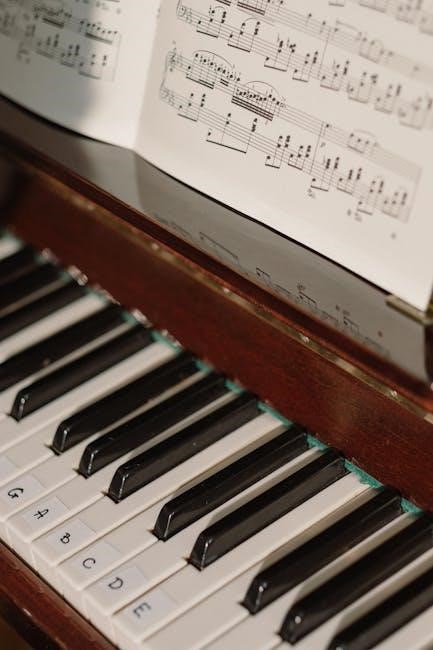“My Heart Will Go On,” the iconic theme from Titanic, is a timeless ballad composed by James Horner with lyrics by Will Jennings. Its sheet music remains a popular choice for pianists, offering various arrangements that cater to different skill levels, making it accessible to both musicians and enthusiasts alike.
1.1 Background and Significance
“My Heart Will Go On,” composed by James Horner with lyrics by Will Jennings, is the iconic theme song from the 1997 film Titanic. Performed by Céline Dion, it became a global phenomenon, winning the Academy Award for Best Original Song. The song’s emotional depth and soaring melody resonated deeply with audiences, making it a timeless classic. Its sheet music, particularly for piano, has been widely sought after due to its adaptability for various skill levels, from beginner to advanced. The piano arrangement captures the song’s essence, emphasizing its romantic and enduring message. This accessibility has made the sheet music a cherished resource for musicians and fans, ensuring the song’s legacy endures across generations.
1.2 Relevance of Sheet Music
The sheet music for “My Heart Will Go On” remains highly relevant due to its timeless appeal and versatility. As the iconic theme from Titanic, it continues to inspire musicians and fans worldwide. The availability of piano sheet music in various formats, including easy and advanced versions, makes it accessible to a broad audience. This adaptability ensures that both novices and skilled pianists can enjoy performing the piece. Additionally, the song’s emotional resonance and historical significance have cemented its place in popular culture, making its sheet music a sought-after resource for those looking to recreate its haunting melody. Its enduring popularity underscores the importance of sheet music in preserving and sharing musical masterpieces.
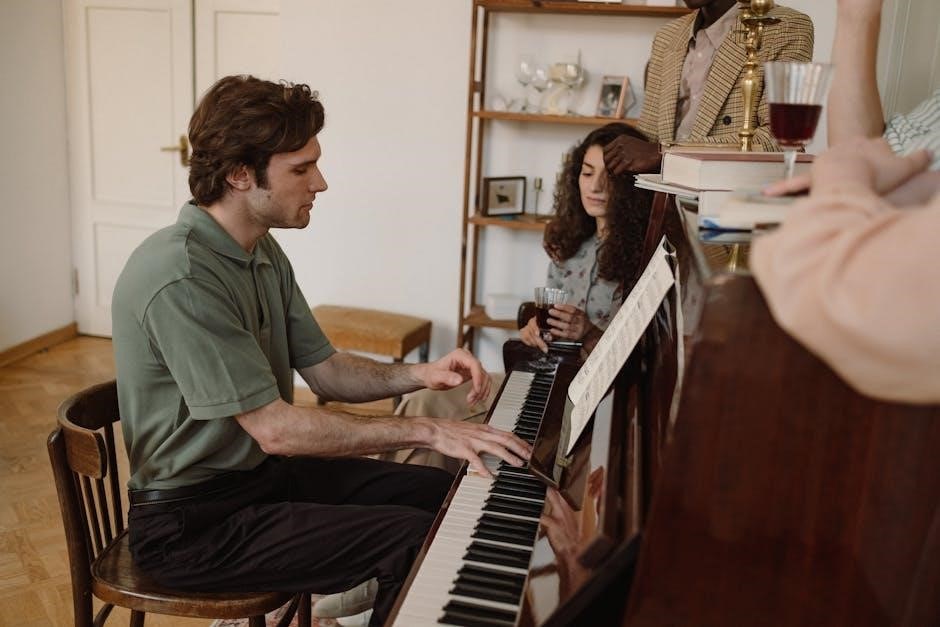
Song Details and Composition
Released in 1997 for the Titanic soundtrack, “My Heart Will Go On” is a powerful adult contemporary ballad. Composed by James Horner with lyrics by Will Jennings, it features a haunting melody and emotional instrumentation, including piano and strings, creating a romantic and timeless appeal that resonates deeply with listeners.
2.1 Overview of the Song
“My Heart Will Go On,” performed by Celine Dion, is the iconic theme song from the 1997 film Titanic. Composed by James Horner with lyrics by Will Jennings, it is a powerful adult contemporary ballad that captures the essence of enduring love and loss. The song features a haunting melody, emotional instrumentation, and Dion’s soaring vocals, making it a timeless classic. Released as a single in December 1997, it became a global phenomenon, topping charts worldwide and winning numerous awards, including the Academy Award for Best Original Song. The piano sheet music version highlights the song’s melodic beauty, with arrangements ranging from simple to advanced, allowing pianists of all levels to connect with its emotional depth and grandeur. Its legacy continues to inspire musicians and fans alike, solidifying its place in pop culture history.
2.2 Composer and Lyricist Information
The music for “My Heart Will Go On” was composed by the renowned film composer James Horner, who is celebrated for his work on numerous iconic film soundtracks. The lyrics were penned by Will Jennings, a talented songwriter known for his emotional and storytelling-driven approach. Horner and Jennings collaborated to create a song that perfectly encapsulates the epic romance and tragedy depicted in Titanic. Their work earned widespread acclaim, with the song topping global charts and winning the Academy Award for Best Original Song in 1998. The sheet music reflects Horner’s orchestral grandeur and Jennings’ heartfelt lyrics, offering pianists a chance to reinterpret this masterpiece in their own style while preserving its emotional essence.
2.3 Musical Structure and Key
“My Heart Will Go On” is composed in the key of E Major, providing a grand and emotive foundation for the song. The structure follows a verse-chorus format, with a bridge that elevates the emotional depth. The piano sheet music captures the song’s progression, beginning with arpeggiated chords in the verses and building to powerful, sustained notes in the chorus. The bridge features a modulation that enhances the song’s dramatic climax. The key of E Major allows for a wide range of dynamics, from soft, introspective moments to soaring highs, making it a compelling piece for pianists to interpret. The song’s structure and key work together to create a timeless, heartfelt ballad that resonates deeply with listeners.
Sheet Music Specifics
The sheet music for “My Heart Will Go On” is arranged for easy piano, featuring six pages of detailed notation, including chord symbols and accompaniment, perfect for pianists of all levels.
3.1 Structure and Composition
The sheet music for “My Heart Will Go On” is structured in a flowing, emotive style, reflecting the song’s epic and romantic essence. Composed in E Major, the piano arrangement captures the melody’s soaring qualities, with a tempo of 100 beats per minute. The sheet music often includes chord symbols, making it versatile for both solo performances and accompaniments. Available in PDF and MIDI formats, the composition is transposable, catering to various skill levels. The arrangement maintains the original’s emotional depth, blending arpeggios and harmonies to evoke the song’s iconic feel. This structure ensures that pianists can faithfully recreate the ballad’s timeless beauty, whether for personal enjoyment or professional performance.
3.2 Challenges in Playing the Piano Version
Playing “My Heart Will Go On” on the piano presents several challenges, particularly for intermediate players. The song’s emotional depth requires precise dynamic control, ensuring soft passages are delicate and crescendos are powerful. The melody’s soaring nature demands strong finger dexterity and sustain pedal control to maintain a lush, legato sound. Additionally, the key of E Major includes several sharps, which can complicate navigation for less experienced pianists. The arpeggio-like patterns and chord progressions in the accompaniment require careful coordination to avoid muddiness. Sustaining long notes without losing pitch or tone is another challenge, especially in the song’s iconic climax. Mastery of tempo and rhythm at 100 BPM is essential to preserve the ballad’s dramatic pacing and heartfelt delivery.
3.3 Popularity of the Piano Arrangement
The piano arrangement of “My Heart Will Go On” remains highly popular among pianists and music enthusiasts. Its timeless melody and emotional depth resonate deeply, making it a favorite for performances and personal enjoyment. The sheet music’s availability in various difficulty levels, from easy to advanced, caters to a broad audience. Many pianists are drawn to the challenges of capturing the song’s cinematic grandeur, while others appreciate the simplicity of its core melody. The arrangement’s adaptability to different playing styles has further cemented its place as a beloved piece in piano repertoire. Its enduring appeal is a testament to the song’s universal connection and the piano’s ability to convey its heartfelt essence effectively.
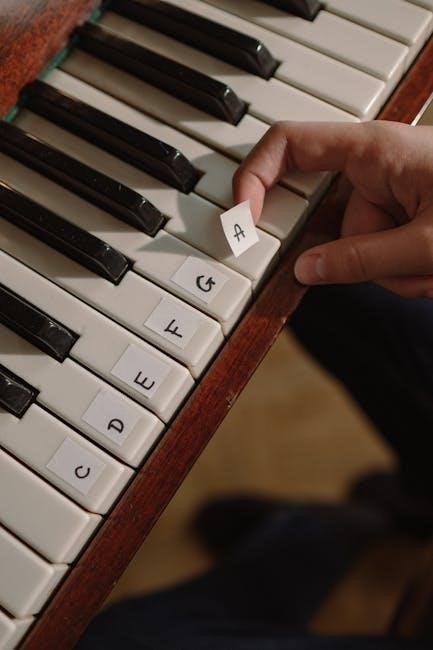
Artist and Performer: Celine Dion
Celine Dion, a world-renowned Canadian singer, brought “My Heart Will Go On” to global acclaim with her powerful vocals and emotional delivery, cementing its place as an iconic ballad.
4.1 Biography and Career Highlights
Céline Marie Claudette Dion, born on March 30, 1968, in Charlemagne, Quebec, Canada, is a globally renowned singer, songwriter, and actress; She rose to fame in the 1980s, winning the Yamaha World Popular Song Festival in 1982 and the Eurovision Song Contest in 1988. Dion’s powerful vocals and emotional delivery have made her one of the best-selling artists of all time. Her collaboration with James Horner and Will Jennings on “My Heart Will Go On” for the film Titanic catapulted her to international stardom, earning her multiple Grammy Awards. Known for her versatility and captivating performances, Celine Dion has become a legendary figure in the music industry.
4.2 Role in Popularizing the Song
Celine Dion’s powerful vocals and emotional delivery played a pivotal role in making “My Heart Will Go On” a global phenomenon. Her performance of the song for the film Titanic seamlessly tied the track to the movie’s epic storyline, enhancing its emotional impact. Dion’s rendition not only topped charts worldwide but also earned her a Grammy Award for Record of the Year. Her live performances, including the 1999 Grammy Awards, further cemented the song’s legacy. The song’s widespread radio play, music videos, and inclusion in Dion’s concerts kept it in the public eye, ensuring its enduring popularity and making it an iconic piece of modern music history.
4;3 Vocal and Musical Style
Celine Dion’s vocal and musical style in “My Heart Will Go On” is characterized by her powerful, emotive delivery and exceptional vocal range. Her ability to seamlessly transition from soft, delicate tones to powerful belting showcases her technical prowess. The song highlights her signature vibrato, adding depth and emotion to the melody. Dion’s phrasing is precise, with a focus on storytelling that resonates deeply with listeners. Her interpretation of the lyrics, combined with James Horner’s haunting composition, creates a dramatic and heartfelt performance. This blend of vocal excellence and musical sensitivity has made the song a timeless classic, further solidifying Dion’s reputation as a world-class vocalist.
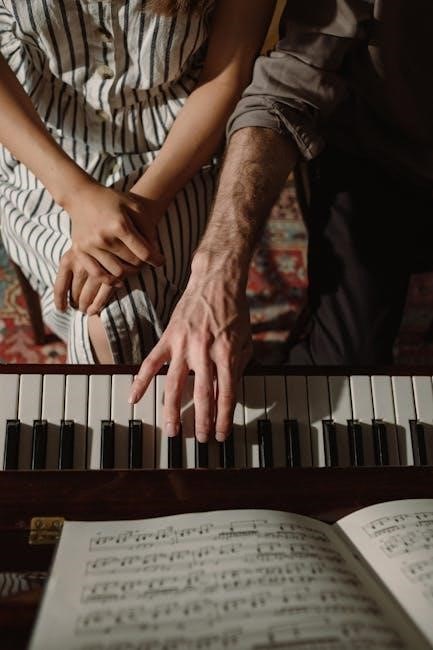
Composer and Arrangements
James Horner composed the iconic music, with lyrics by Will Jennings. The song’s sheet music arrangements are available for piano, vocals, and various instruments, ensuring versatility and appeal.
5.1 James Horner’s Contribution
James Horner’s masterful composition of My Heart Will Go On became the emotional cornerstone of the film Titanic. His haunting melody, combined with Will Jennings’ poignant lyrics, created a timeless ballad that resonated globally. Horner’s orchestration, blending sweeping strings and subtle piano undertones, captured the film’s epic romance and tragedy. The song’s success earned Horner an Academy Award for Best Original Song, solidifying his legacy. His work not only elevated the film but also inspired countless arrangements, including piano sheet music, which remains popular among musicians and fans. Horner’s contribution to the song’s enduring appeal is undeniable, making it a lasting tribute to his artistic genius.
5.2 Arrangements for Different Instruments
The timeless appeal of My Heart Will Go On is evident in its diverse arrangements for various instruments. Beyond the iconic piano version, the song is transcribed for guitar, flute, and even full orchestral ensembles. These arrangements maintain the emotional depth of James Horner’s composition while adapting to the unique qualities of each instrument. For pianists, both simplified and advanced sheet music options are available, catering to different skill levels. Additionally, MIDI files and accompaniment tracks provide further flexibility for performers. The song’s versatility has led to its adaptation for instruments like the violin and cello, ensuring its enduring presence across musical genres and formats. This wide range of arrangements underscores the song’s universal appeal and lasting influence.
5.3 Evolution of Sheet Music Versions
The sheet music for My Heart Will Go On has evolved significantly since its release, adapting to changing musical trends and technological advancements. Originally composed for piano and vocals, it expanded to include arrangements for guitar, orchestral ensembles, and even simplified versions for beginners. Over time, digital formats like PDF and MIDI became popular, offering convenience and accessibility. The rise of platforms like MuseScore and Scribd further democratized access, allowing musicians to download and print sheet music effortlessly. Additionally, interactive tools now enable users to transpose keys and adjust tempos, catering to diverse skill levels. This evolution ensures the song remains relevant and accessible to new generations of musicians and fans alike.
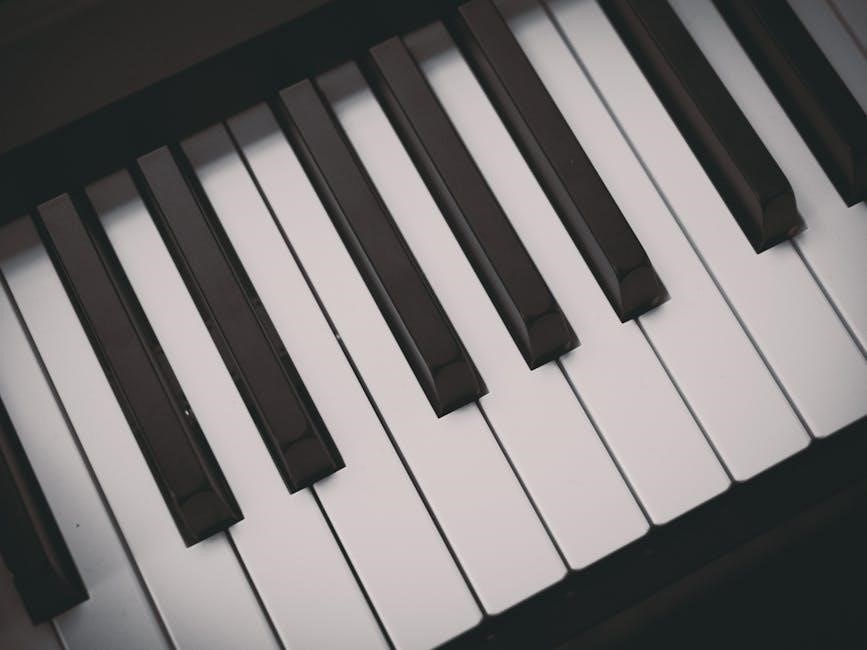
Licensing and Copyright
My Heart Will Go On sheet music is copyrighted by Famous Music Corporation, Ensign Music Corporation, and TCF Music Publishing, Inc. Licensing ensures legal use, preventing unauthorized distributions.
6.1 Copyright Information
The sheet music for My Heart Will Go On is protected under copyright by Famous Music Corporation, Ensign Music Corporation, and TCF Music Publishing, Inc.. Originally registered in 1997, the rights ensure that all distributions, adaptations, or performances require proper authorization. Unauthorized use, such as in political campaigns without permission, has led to legal disputes. Celine Dion’s team has explicitly denounced unauthorized use, emphasizing the importance of adhering to copyright laws. Licensing agreements are essential to legally access and perform the piece, whether for personal or public use. Violations can result in legal consequences, highlighting the need for compliance with copyright regulations.
6.2 Licensed Versions Availability
Licensed versions of My Heart Will Go On sheet music are widely available through official platforms like Musicnotes, Sheet Music Plus, and MuseScore. These sites offer high-quality, legally authorized arrangements for piano, vocal, and instrumental ensembles. Formats include PDF and MIDI, ensuring compatibility with various devices and software. Both free and paid versions exist, with paid options often providing additional features like transposition or accompaniment tracks. Purchasing from licensed sources guarantees adherence to copyright laws and supports the creators. Digital downloads make it easy to access and print the music instantly, catering to musicians of all levels. Always verify the seller’s authorization to ensure legitimacy and quality.
6.4 Recent News on Usage Rights
Recent news highlights unauthorized use of My Heart Will Go On in political campaigns, notably by Donald Trump during a rally in Montana. Celine Dion’s team issued a statement denying authorization, emphasizing that her music was used without permission. This incident sparked discussions about copyright enforcement and the importance of obtaining proper licenses. Legal representatives for Dion and the song’s creators have reiterated the necessity of adhering to licensing agreements to avoid such unauthorized use. These developments underscore the ongoing relevance of copyright protections in the digital age, especially for iconic works like this Titanic theme.

Downloading Sheet Music
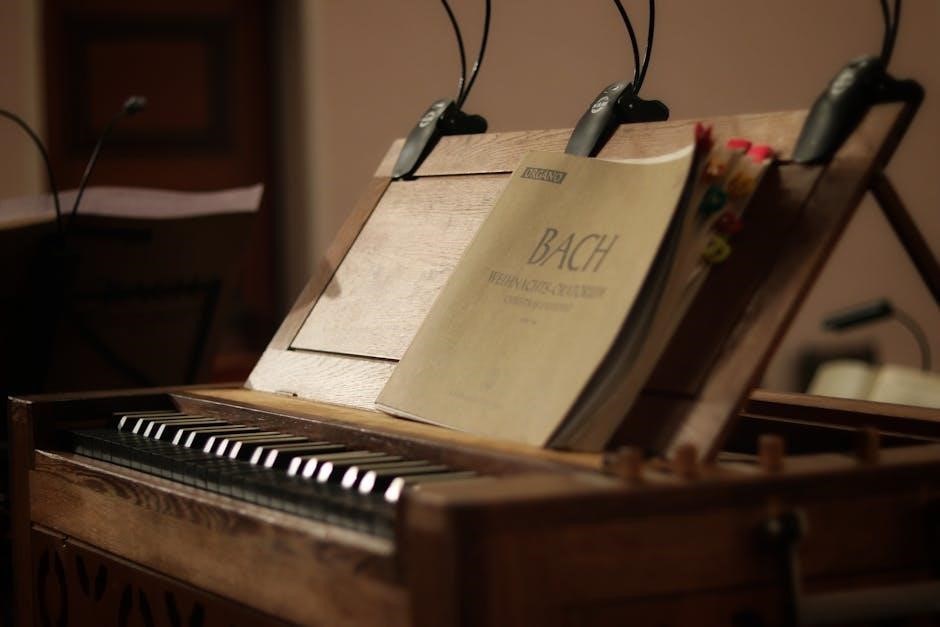
My Heart Will Go On sheet music is widely available online in PDF and MIDI formats. Platforms like MuseScore and Sheet Music Plus offer both free and paid versions, catering to different skill levels with arrangements ranging from easy piano to advanced transpositions.
7.1 Sources for Download
Sheet music for My Heart Will Go On is available from various online platforms. Reputable sources include MuseScore, Musicnotes, and Sheet Music Plus, offering both free and paid versions. These sites provide arrangements for solo piano, piano-vocal, and instrumental ensembles. Additionally, platforms like Scribd and PDFDrive host free PDF downloads, though users should verify the legitimacy of such sources. For those seeking high-quality, licensed sheet music, paid options ensure accuracy and completeness. Always check for copyright compliance when downloading to ensure legal and safe access to the music.
7.2 Free vs. Paid Options
When searching for My Heart Will Go On sheet music, users can choose between free and paid options. Free versions are widely available on platforms like MuseScore and Scribd, offering basic arrangements suitable for personal use. However, these may lack complexity or accuracy. Paid options from Musicnotes and Sheet Music Plus provide high-quality, professionally transcribed arrangements, often featuring multiple instrument parts and transposable keys. Paid versions are ideal for performers or educators seeking precise notation. While free options are cost-effective, paid sheet music ensures superior quality and legality, supporting the creators and offering a more polished musical experience for pianists of all levels.
7.3 Tips for Choosing the Right Version
Choosing the right version of My Heart Will Go On sheet music depends on your skill level and preferences. For beginners, opt for simplified or easy piano arrangements, which simplify complex melodies. Intermediate players may prefer transcriptions that retain the original’s emotional depth but remain manageable. Advanced pianists can explore intricate solo or accompaniment versions. Check the arrangement’s key, as the original is in E Major. Look for versions with chord symbols or vocal lines if needed. Additionally, consider whether the sheet music includes MIDI files or performance notes. Reading reviews or previews can help ensure the arrangement matches your needs. Finally, verify the source’s legality to support creators and ensure quality.

Playing the Sheet Music
Playing My Heart Will Go On sheet music offers a rewarding experience, capturing the song’s emotional depth. Start with a slow tempo, focus on dynamics, and gradually build intensity for a heartfelt performance;

8.1 Beginner’s Guide
Beginners can start by selecting a simplified version of My Heart Will Go On sheet music, such as the Easy Piano arrangement. Start with a slow tempo to master the melody and chord progressions. Practice hands separately, focusing on the right-hand melody and left-hand chordal accompaniment. Use a metronome to maintain steady timing. Pay attention to dynamics, swells, and emotional phrasing to capture the song’s essence. Break the piece into sections and gradually increase speed as confidence grows. Emphasize legato playing for a smooth sound. Avoid rushing or ignoring pedal markings, as they enhance the piece’s dramatic feel. With patience and consistent practice, beginners can beautifully perform this iconic ballad.
8.2 Intermediate and Advanced Techniques
Intermediate and advanced pianists can enhance their performance of My Heart Will Go On by incorporating intricate runs, arpeggios, and nuanced dynamics. Experiment with expressive phrasing to convey the song’s emotional depth. Focus on refining chord voicings and pedaling techniques to achieve a rich, resonant sound. Advanced players can explore harmonically complex arrangements or incorporate improvisational elements. Pay attention to tempo rubato and subtle variations in timing to add personal interpretation. For a more dramatic effect, emphasize the climactic sections with powerful fortissimo passages and delicate pianissimo transitions. Mastery of these techniques will elevate the performance, capturing the song’s timeless elegance and emotional impact. This level of artistry requires dedication and a deep connection to the music’s essence;
8.3 Common Mistakes to Avoid
When playing My Heart Will Go On, pianists often overlook proper pacing, leading to a rushed or dragging tempo. Ensure adherence to the metronome marking of 100 BPM for a balanced performance. Another common error is inaccurate chord voicings, particularly in the E Major sections, which can muddy the sound. Pay close attention to pedaling techniques to avoid excessive sustain, especially in delicate passages. Overlooking dynamic contrasts is another pitfall; emphasize the crescendos and diminuendos to maintain emotional intensity. Additionally, avoid neglecting fermata markings, as they are crucial for dramatic pauses. Finally, ensure precise articulation, especially in arpeggio patterns, to preserve clarity and definition in the melody. Attending to these details will enhance the overall quality and emotional impact of the performance. This meticulous approach ensures a faithful rendition of the beloved ballad.
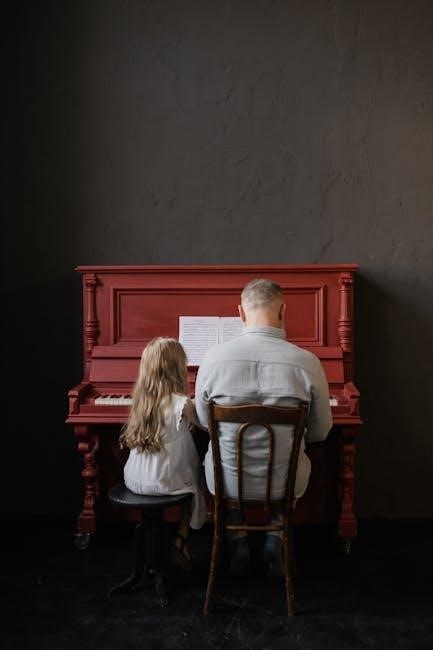
Cultural and Historical Impact
My Heart Will Go On became an cultural phenomenon, immortalizing the legacy of Titanic. Its widespread acclaim earned numerous awards, solidifying its place in music history and popular culture.
9.1 Role in the Film Titanic
My Heart Will Go On was the iconic theme song for James Cameron’s 1997 film Titanic, perfectly capturing the emotional depth of the tragic love story between Jack and Rose. Composed by James Horner with lyrics by Will Jennings, the song was performed by Celine Dion and played during the film’s end credits. Its haunting melody and poignant lyrics resonated deeply with audiences worldwide, becoming inseparable from the film’s legacy. The song’s placement in the movie allowed it to stand out, earning it widespread acclaim and numerous awards, including the Academy Award for Best Original Song. Its association with Titanic cemented its status as a cultural touchstone, enduring long after the film’s release.
9.2 Awards and Recognition
My Heart Will Go On earned widespread critical acclaim and numerous prestigious awards. It won the Academy Award for Best Original Song in 1998, solidifying its place in cinematic history. Additionally, the song claimed the Golden Globe Award for Best Original Song and multiple Grammy Awards, including Record of the Year and Best Female Pop Vocal Performance for Celine Dion. These accolades underscored the song’s emotional depth and universal appeal. Its success also topped charts worldwide, including the Billboard Hot 100, further cementing its legacy. The song’s recognition not only highlighted its artistic merit but also its enduring impact on popular culture and music history.
9.3 Usage in Political Campaigns
The iconic ballad My Heart Will Go On has unexpectedly found its way into political campaigns, sparking controversy. Notably, Donald Trump and J.D. Vance used the song during a rally in Montana without Celine Dion’s authorization, prompting her team to issue a statement denouncing the unauthorized use. This incident highlighted the song’s enduring popularity but also raised questions about copyright and artist consent in political contexts. The backlash underscored the importance of proper licensing and the sensitive nature of using beloved songs in such settings. Despite its unintended political appearances, the song remains a cultural phenomenon, primarily celebrated for its emotional connection to the film Titanic.
My Heart Will Go On remains an iconic ballad, deeply tied to Titanic’s legacy. Its sheet music continues to inspire pianists, ensuring its timeless appeal and emotional resonance endure.
10.1 Summary of Key Points
My Heart Will Go On, the iconic theme from Titanic, remains a timeless ballad that continues to resonate with audiences globally. Composed by James Horner and performed by Celine Dion, the song’s sheet music is widely sought after by pianists of all skill levels. Its availability in various formats, including easy piano arrangements and advanced versions, ensures accessibility for both beginners and seasoned musicians. The song’s emotional depth and cinematic ties make it a beloved choice for performances and personal enjoyment. Additionally, its popularity has led to numerous adaptations and interpretations, further cementing its place in musical history. The enduring appeal of My Heart Will Go On is a testament to its lasting legacy in both film and music.
10.2 Final Thoughts on the Song’s Legacy
My Heart Will Go On stands as a timeless masterpiece, transcending generations with its emotional depth and cinematic allure. Its enduring popularity is evident in its widespread use in various formats, from piano sheet music to orchestral arrangements. The song’s legacy is further cemented by its role in the iconic film Titanic, which propelled it to global acclaim. As a cultural phenomenon, it continues to inspire musicians and fans alike, with its sheet music remaining a sought-after resource for pianists. The song’s ability to evoke profound emotion ensures its place in musical history, solidifying its status as one of the most memorable and enduring songs of our time.
